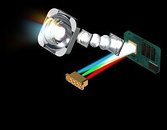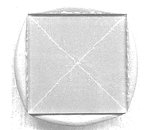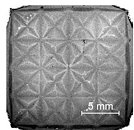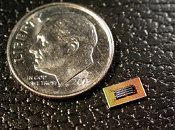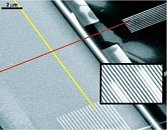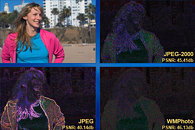Apr 24th, 2025 16:53 EDT
change timezone
Latest GPU Drivers
New Forum Posts
- Are the 8 GB cards worth it? (166)
- Cracks in my cpu waterblock should I be concerned? (10)
- RTX 5070ti - Which MSRP model has the better/quieter cooler design, ASUS Prime, Gigabyte Windforce or PNY? (5)
- Current Sales, Bundles, Giveaways (10324)
- RX 9000 series GPU Owners Club (511)
- Choosing an Internal HDD (11)
- New OLED monitor makes PC unresponsive sometimes (10)
- I dont understand the phone OS world..... (44)
- What's your latest tech purchase? (23589)
- Post Your TIMESPY, PCMARK10 & FIRESTRIKE SCORES! (2019) (290)
Popular Reviews
- NVIDIA GeForce RTX 5060 Ti 8 GB Review - So Many Compromises
- Colorful iGame B860M Ultra V20 Review
- Crucial CUDIMM DDR5-6400 128 GB CL52 Review
- ASUS GeForce RTX 5060 Ti TUF OC 16 GB Review
- ASRock X870E Taichi Lite Review
- Upcoming Hardware Launches 2025 (Updated Apr 2025)
- Sapphire Radeon RX 9070 XT Pulse Review
- Sapphire Radeon RX 9070 XT Nitro+ Review - Beating NVIDIA
- AMD Ryzen 7 9800X3D Review - The Best Gaming Processor
- NVIDIA GeForce RTX 5060 Ti PCI-Express x8 Scaling
Controversial News Posts
- NVIDIA GeForce RTX 5060 Ti 16 GB SKU Likely Launching at $499, According to Supply Chain Leak (182)
- NVIDIA Sends MSRP Numbers to Partners: GeForce RTX 5060 Ti 8 GB at $379, RTX 5060 Ti 16 GB at $429 (127)
- NVIDIA Launches GeForce RTX 5060 Series, Beginning with RTX 5060 Ti This Week (115)
- Nintendo Confirms That Switch 2 Joy-Cons Will Not Utilize Hall Effect Stick Technology (105)
- Nintendo Switch 2 Launches June 5 at $449.99 with New Hardware and Games (99)
- Sony Increases the PS5 Pricing in EMEA and ANZ by Around 25 Percent (85)
- NVIDIA PhysX and Flow Made Fully Open-Source (77)
- Windows Notepad Gets Microsoft Copilot Integration (75)
News Posts matching #Science
Return to Keyword BrowsingMIT Scientists Invent Wireless Electricity
Completely changing the way we use electricity, a group from the Massachusetts Institute of Technology has successfully beamed electricity from a magnetic coil to a 60 watt light bulb 7 feet away. The phenomenon called electromagnetic induction is already used in transformers and electric motors but they must be close enough for power to pass from one another. Dr Soljacic, the lead researcher on the project, discovered that a transmitter could be used to fill a room with a 'non-radiative' electromagnetic field rather than the traditional transmitter/receiver method powering electric devices wirelessly. For a diagram of how WiTricity works follow the link.

BlueGene Simulates half a mouse brain
IBM's supercomputer Blue Gene/L has been used to run a 'cortical simulator' as complex as half of a mouse brain. The researchers say that their work has shown characteristics of thought patterns observed in real mouse brains, and are now working on improving the simulation to allow it to run faster in order to make it more neurobiologically faithful. Blue Gene/L is one of four Blue Gene projects in development and is the fastest computer in the world with a theoretical peak of 360 TFLOPS. Using 4,096 processors, each with 256MB of memory, the team managed to create a virtual mouse brain that had 8,000 neurons with up to 6,300 synapses each. Real mouse brains will have about 16,000 neurons which can have up to 8,000 synapses (connections with other nerve fibres) each.

IBM Working on CPU Stacking
IBM Moves Moore's Law into the Third-Dimension
Armonk, NY - 12 Apr 2007: IBM (NYSE: IBM) today announced a breakthrough chip-stacking technology in a manufacturing environment that paves the way for three-dimensional chips that will extend Moore's Law beyond its expected limits. The technology - called "through-silicon vias" -- allows different chip components to be packaged much closer together for faster, smaller, and lower-power systems.
The IBM breakthrough enables the move from horizontal 2-D chip layouts to 3-D chip stacking, which takes chips and memory devices that traditionally sit side by side on a silicon wafer and stacks them together on top of one another. The result is a compact sandwich of components that dramatically reduces the size of the overall chip package and boosts the speed at which data flows among the functions on the chip.
Armonk, NY - 12 Apr 2007: IBM (NYSE: IBM) today announced a breakthrough chip-stacking technology in a manufacturing environment that paves the way for three-dimensional chips that will extend Moore's Law beyond its expected limits. The technology - called "through-silicon vias" -- allows different chip components to be packaged much closer together for faster, smaller, and lower-power systems.
The IBM breakthrough enables the move from horizontal 2-D chip layouts to 3-D chip stacking, which takes chips and memory devices that traditionally sit side by side on a silicon wafer and stacks them together on top of one another. The result is a compact sandwich of components that dramatically reduces the size of the overall chip package and boosts the speed at which data flows among the functions on the chip.

Australian study concludes that Microsoft PowerPoint is a 'disaster'
Australian professors at the University of NSW have done some significant PowerPoint research. If you ever get bored watching a PowerPoint presentation while someone is talking, then you're not alone, and there's a scientific reason behind this. Scientists have discovered that people learn best when given media on paper or verbal media. A combination of the two tends to cause a brain overload, mixes the two forms of information, and can hurt a lot more than it can help. This is due to the fact that the brain can only handle two or three tasks at once, and otherwise will start to budget time away from some tasks to help others Professor Sweller says that "It is effective to speak to a diagram, because it presents information in a different form. But it is not effective to speak the same words that are written, because it is putting too much load on the mind and decreases your ability to understand what is being presented."
Laser TV Set to Compete Against Plasma and LCD
A new technology called Laser TV could soon be in stores competing against plasma and LCD televisions if California based company Novalux has its way with things. The new laser TVs is designed to be used for either front/rear projection and because it can be used in current rear-projection cabinets it should be cheaper to produce. Not only will it cost less than LCD and plasma, it also boasts double the colour range and uses three-quarters less power, which should attract those who are after the best image quality available. However, the downside of laser technology remains in the design of rear-projection TVs: because of the way they work, they have a much deeper profile than LCD or Plasma TVs, so they are not ideal for hanging on walls. Sony's prototype laser TV (shown below on the left) is estimated to have a depth of between 8" and 10", whilst even large LCD displays are under 5". Novalux already has four designs ready and is in discussions with numerous OEMs, with the company hoping to see the technology go on sale in 2008.
Website readers have longer attention spans
Or so a study of 600 Americans claims. When given a newspaper article, the average American will read 75% of it if it is on a website. This isn't too bad, especially when compared to the 62% of an article in the average reliable newspaper (like The Boston Globe) the average American will read. The same American will read about 57% of an article published in a tabloid-style newspaper, such as The Weekly World News. These numbers are surprising, especially considering how much effort people will put into putting a news story in print. However, if you consider how much longer the average newspaper article is, maybe newspaper-readers do have longer attention spans after all.

IBM Improves CPU Cooling
New research by Big Blue could see CPUs running up to 40% cooler in the near future, without needing prices to rocket. In a paper released at the IEEE Semi-Therm conference, IBM published ideas designed to make thermal paste more efficient, therefore allowing for an improved cooling capacity leading to cooler processors. According to IBM, current thermal paste techniques can lead to 40% of heat given off by the CPU being absorbed by the particles in the paste, largely caused by the fact that the particles don't spread evenly, leading to the "Magic Cross" shown in the image below and to the left. IBM's new technology involves integrating micro-meter length trenches into the copper cap that sits above the CPU core (below on the right), which will allow thermal paste to be more evenly distributed and will lead to a third less thermal paste being required, as well as halving the pressure required to fit a CPU cooler. IBM still needs to finalise the research, but this relatively in-expensive method could be integrated into new CPUs and coolers before too long. For more detailed information you can read IBM's press release.

IBM Researchers Demonstrate World's Fastest Optical Chipset
At the 2007 Optical Fiber Conference, IBM scientists will reveal a prototype optical transceiver chipset capable of reaching speeds at least eight times faster than optical components available today. The breakthrough could transform how data is accessed, shared and used across the Web for corporate and consumer networks. The transceiver is fast enough to reduce the download time for a typical high definition feature-length film to a single second compared to 30 minutes or more.
Raytheon Develops World's First Polymorphic Computer
EL SEGUNDO, Calif., March 20 -- The world's first computers whose architecture can adopt different forms depending on their application have been developed by Raytheon Company (NYSE: RTN).
Dubbed MONARCH (Morphable Networked Micro-Architecture) and developed to address the large data volume of sensor systems as well as their signal and data processing throughput requirements, it is the most adaptable processor ever built for the Department of Defense, reducing the number of processor types required. It performs as a single system on a chip, resulting in a significant reduction of the number of processors required for computing systems, and it performs in an array of chips for teraflop throughput.
Dubbed MONARCH (Morphable Networked Micro-Architecture) and developed to address the large data volume of sensor systems as well as their signal and data processing throughput requirements, it is the most adaptable processor ever built for the Department of Defense, reducing the number of processor types required. It performs as a single system on a chip, resulting in a significant reduction of the number of processors required for computing systems, and it performs in an array of chips for teraflop throughput.

Racing games increase likeliness of destructive driving decisions in the real world
German researchers have recently conducted a study to determine the effects of games that promote risky decisions on real-world driving. These researchers took a batch of subjects (both women and men), and divided them into three groups. The first group played first person shooter games, such as Medal of Honor. The second group played more calming/family-oriented games, like Crash Bandicoot. The third group played hardcore racing games such as Need For Speed. All test subjects got to play these games on a Sony PlayStation 2 on a gigantic 72" television. The results of this experiment drew parallels between racing games that promoted violent/risky decisions in the game and violent/risky decisions in real life. First person shooters and family-oriented games did next to nothing to a subject's driving ability. However, racing games did a ton to a subject's actual driving.
EIAA report shows wireless internet users spend more time on internet
The EIAA (European Interactive Advertising Association) has proved in a recent report what we probably could have guessed ourselves. People who own wireless computers (such as the one I'm using right now) are very likely to do things such as contribute to websites (such as this one), make/spread user-generated content (like this), and review/rate content on websites like YouTube. On average, people who own a wireless laptop/device spend 18 hours a week on the internet, as opposed to 11 hours that the average wired user would spend. This is because, you guessed it, wireless users can bring their computer with them, instead of having to come to it.
MIT To Put Its Entire Curriculum Online Free Of Charge
In 2002, when MIT decided to experiment with placing course contents on the Web for open access, the university's officials knew they were breaking new ground and had no idea how the effort would be received.
On Tuesday, school officials revealed plans to make available the university's entire 1,800-course curriculum by year's end. Currently, some 1.5 million online independent learners log on the MIT OpenCourseWare (OCW) site every month and more than 120 universities around the world have inaugurated their own sites for independent learners. MIT has more than 1,500 course curriculums available online to date.
On Tuesday, school officials revealed plans to make available the university's entire 1,800-course curriculum by year's end. Currently, some 1.5 million online independent learners log on the MIT OpenCourseWare (OCW) site every month and more than 120 universities around the world have inaugurated their own sites for independent learners. MIT has more than 1,500 course curriculums available online to date.
Bacteria Could be the Next Form of Storage
A group of researchers at Keio University in Japan has developed a new technology which uses bacterial DNA as a medium for long-term data storage. Although it's not incredible in terms of data capacity, the technology works by creating artificial DNA carrying information, which is then inserted into the bacterial genome sequence. After this, the DNA will multiply, reproducing the data. This can therefore act as a long-term method of storage because the DNA will be passed down from generation to generation - possibly for thousands of years (current storage methods will only last a few centuries). So far the researchers have only managed to encode "e= mc2 1905!", but there is potential for the future.
It's not dead! - Star Trek will be back on Christmas Day in 2008
On the Christmas Day next year the highly anticipated next Star Trek movie will be in cinemas Paramount Pictures announced yesterday! After cancelling the Star Trek: Enterprise series in March 2005, the mediocre space combat game "Star Trek: Legacy", which even die-hard trekkies found to be a bitter pill, and more than 4 years without a movie it was about time for someone at Paramount to make a decision.
And like this another one decided to take the opportunity and to direct the upcoming motion picture: Jeffrey Jacob Abrams. J.J. Abrams, known for directing and producing Mission: Impossible III and the very famous and successful Alias and Lost series, teams up with the writers and producers Bryan Burk (Lost, Alias), Damon Lindelof (Lost, Crossing Jordan), Alex Kurtzman (M:i:III, The Legend of Zorro) and Roberto Orci (M:i:III, The Legend of Zorro).
With all these experienced people working on it I am really interested if Star Trek XI will meet my expactations.
And like this another one decided to take the opportunity and to direct the upcoming motion picture: Jeffrey Jacob Abrams. J.J. Abrams, known for directing and producing Mission: Impossible III and the very famous and successful Alias and Lost series, teams up with the writers and producers Bryan Burk (Lost, Alias), Damon Lindelof (Lost, Crossing Jordan), Alex Kurtzman (M:i:III, The Legend of Zorro) and Roberto Orci (M:i:III, The Legend of Zorro).
With all these experienced people working on it I am really interested if Star Trek XI will meet my expactations.
Chinese scientists create RC pigeon
Scientists at Shandong university in east China succesfully implanted micro electrodes in a pigeons brain. The electrodes simulate specific parts of the brain forcing the pigeon to comply with the given commands.
The technology is being improved so it could be put to practical use in the future. The pigeon is the second succesful remote control animal since a similar experiment on mice in 2005.
The technology is being improved so it could be put to practical use in the future. The pigeon is the second succesful remote control animal since a similar experiment on mice in 2005.
F-22 Raptor running on Windows?
I am really sorry for posting a headline like this because this is a dead serious issue Lockheed Martin und Boeing are being faced with. Today CNN reported on television that every fighter lost all navigation and communications when they crossed the international date line. These problems remind me of some bugs discovered around the turn of the year 2000, which would rather not come to my mind when thinking about the world's most expensive stealth fighter (361 million US Dollars per unit!).
SETI definitely 'found something'.
Since the project's inception, SETI has been searching for alien life in the depths of outer space. When Melinda Kimberly had her laptop stolen, SETI, which was loaded in the background, continued it's search for extraterrestrials. This meant that it continued to link to the SETI main network. Melinda's clever husband used SETI to search for those access attempts, logged the IP addresses of them, and then reported the stolen laptop with it's recent IP addresses to the police. The laptop was recovered with all data intact, and no arrests were made. SETI developers were reportedly very happy that their software "actually found something".
It's all about POWER!
I had some sort of a debate lately regarding overrated power supplies and their necessity. And when I came to browse through the websites that I read on a weekly basis afterwards I found a very interesting article about how to prevent electrical fires caused by draining too much power from the wall outlets. Though the stated formulae, calculations and hardware devices are dedicated to the '110V world' only the theory behind is applicable to the rest of us with ease.
Daylight-saving glitch threatens mini-Y2K
Daylight saving time arrives a little earlier - March 11 - and stays a little later - Nov. 4 - this year. And it's bringing a problem along with it that could affect everything from stock trades to airline schedules to your BlackBerry.
Software created before the law mandating the change passed in 2005 is set to automatically advance its timekeeping by one hour on the first Sunday in April, not the second Sunday in March. Congress decided that more early evening daylight would translate into energy savings.
The result is a glitch reminiscent of the Y2K bug, when cataclysmic crashes were feared if computers interpreted the year 2000 as 1900 and couldn't reconcile time appearing to move backward. If banks and other institutions aren't properly prepared, automatic stock trades reportedly might happen at the wrong hour, buildings that unlock at a certain time could stay shut, and airline flight schedules could be scrambled.MSNBC
Software created before the law mandating the change passed in 2005 is set to automatically advance its timekeeping by one hour on the first Sunday in April, not the second Sunday in March. Congress decided that more early evening daylight would translate into energy savings.
The result is a glitch reminiscent of the Y2K bug, when cataclysmic crashes were feared if computers interpreted the year 2000 as 1900 and couldn't reconcile time appearing to move backward. If banks and other institutions aren't properly prepared, automatic stock trades reportedly might happen at the wrong hour, buildings that unlock at a certain time could stay shut, and airline flight schedules could be scrambled.MSNBC
Games May Improve Vision
According to research by the University of Rochester, video games with a lot of action may actually help to improve performance. During the project, researchers found that those who played video games for a few hours a day over the course of a month improved their ability to identify letters in a cluster by 20%, a test similar to ones used in standard ophthalmology clinics. Those playing Tetris saw no improvement in vision, but those playing Unreal Tournament could see which way the "T" in crowd of other letter and symbols was pointing much easier than before.
Intel Science Talent Search Finalists Announced
For the first time in 66 years, there are an equal number of female and male finalists.
Forty high school seniors today were named finalists for the Intel Science Talent Search (Intel STS) 2007. The competition is America's oldest and most prestigious high school science competition; six former finalists have won the Nobel Prize and others have been awarded the Fields Medal, the National Medal of Science and MacArthur Foundation fellowships.
Forty high school seniors today were named finalists for the Intel Science Talent Search (Intel STS) 2007. The competition is America's oldest and most prestigious high school science competition; six former finalists have won the Nobel Prize and others have been awarded the Fields Medal, the National Medal of Science and MacArthur Foundation fellowships.
Memory Circuits the Size of a White Blood Cell
Chemists from UCLA and the California Institute of Technology have managed to create an ultra-dense memory device capable of storing 100 Gb (gigabits) per square centimetre, an accomplishment which could lead to much smaller and more powerful computers than we have today. The memory uses a series of perpendicular nanowires crossing over each other, with 400 silicon wires crossed by 400 titanium wires, both 16nm wide. At each crossing are approximately 300 bistable rotaxane molecules which can act as switches and therefore be used to store data in a very small space.
GPS Spreading Viruses
Although the GPS device itself is not affected by this, the TomTom GO 910 has been reported to be carrying Trojans win32.Perlovga.A and TR/Drop.Small.qp. Any of the $599 units manufactured between September and November last year may have been manufactured with these two Trojans "pre-installed" for you. Apparently TomTom is aware of this, yet so far no warning has been released to consumers - although the viruses pose very little risk and if you keep your anti-virus software up to date you should be fine. TomTom claims "Appropriate actions have been taken to make sure this is prevented from happening again in the future." These Trojans can potentially spread to your PC if you connect it to synchronise information or load routes.
Microsoft's new picture format gaining momentum
Microsoft, back in May, began promoting it's new "Windows Media Photo" standard, which has been since renamed HD Photo. Microsoft is very clear with it's ambitions: They want to replace JPEG as the primary format for pictures. While some would argue that overtaking JPEG as the most popular picture format is a bit overzealous, Microsoft has two figurative ace-in-the-hole's. The first is that Microsoft will be shipping it with Windows Vista. That means that people who use Windows Vista will be able to see HD Photo, regardless of the photo viewer. This isn't exactly the kind of thing you need to switch people to a picture format. So Adobe systems will patch Photoshop CS3 after it is released to support HD Photo. This will allow users to save their pictures in HD Photo. CNET editors call these methods "pervasive", but they could very well be effective. The picture below shows what the difference is between JPEG and HD Photo when talking about compression. The less color in the picture, the less distortion there is, so ideally a perfect compression would be pitch black.
Dye could lead to faster internet
According to researchers at the Chinese Academy of Science, Washington State University, and the University of Leuven, a new dye has been developed which could potentially see much faster internet connections. Their work shows that the dye interacts more strongly with light than any other known material, possibly even 50% better. This would mean that if it was integrated into optical based networks or internet connections it could wield much faster transfer rates, as well as giving the optical tubes a more colorful appearance. So far, no predictions have been made about when this technology can be expected to become available to consumers, but it's likely to be a few years away yet.
Apr 24th, 2025 16:53 EDT
change timezone
Latest GPU Drivers
New Forum Posts
- Are the 8 GB cards worth it? (166)
- Cracks in my cpu waterblock should I be concerned? (10)
- RTX 5070ti - Which MSRP model has the better/quieter cooler design, ASUS Prime, Gigabyte Windforce or PNY? (5)
- Current Sales, Bundles, Giveaways (10324)
- RX 9000 series GPU Owners Club (511)
- Choosing an Internal HDD (11)
- New OLED monitor makes PC unresponsive sometimes (10)
- I dont understand the phone OS world..... (44)
- What's your latest tech purchase? (23589)
- Post Your TIMESPY, PCMARK10 & FIRESTRIKE SCORES! (2019) (290)
Popular Reviews
- NVIDIA GeForce RTX 5060 Ti 8 GB Review - So Many Compromises
- Colorful iGame B860M Ultra V20 Review
- Crucial CUDIMM DDR5-6400 128 GB CL52 Review
- ASUS GeForce RTX 5060 Ti TUF OC 16 GB Review
- ASRock X870E Taichi Lite Review
- Upcoming Hardware Launches 2025 (Updated Apr 2025)
- Sapphire Radeon RX 9070 XT Pulse Review
- Sapphire Radeon RX 9070 XT Nitro+ Review - Beating NVIDIA
- AMD Ryzen 7 9800X3D Review - The Best Gaming Processor
- NVIDIA GeForce RTX 5060 Ti PCI-Express x8 Scaling
Controversial News Posts
- NVIDIA GeForce RTX 5060 Ti 16 GB SKU Likely Launching at $499, According to Supply Chain Leak (182)
- NVIDIA Sends MSRP Numbers to Partners: GeForce RTX 5060 Ti 8 GB at $379, RTX 5060 Ti 16 GB at $429 (127)
- NVIDIA Launches GeForce RTX 5060 Series, Beginning with RTX 5060 Ti This Week (115)
- Nintendo Confirms That Switch 2 Joy-Cons Will Not Utilize Hall Effect Stick Technology (105)
- Nintendo Switch 2 Launches June 5 at $449.99 with New Hardware and Games (99)
- Sony Increases the PS5 Pricing in EMEA and ANZ by Around 25 Percent (85)
- NVIDIA PhysX and Flow Made Fully Open-Source (77)
- Windows Notepad Gets Microsoft Copilot Integration (75)

